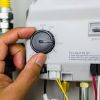How To Guide
to Home Energy Improvements and Rebates and Tax Credits
Choose from one of the five options below to explore possible home improvements that will reduce your home’s energy costs and carbon footprint
Love Electric provides information and resources to help make your home more efficient, healthier, and with lower carbon emissions. This page provides a simple guide to prioritizing your actions and finding rebates available to help you pay for improvements.





